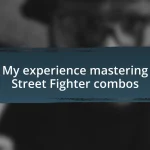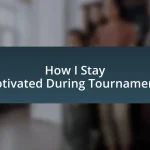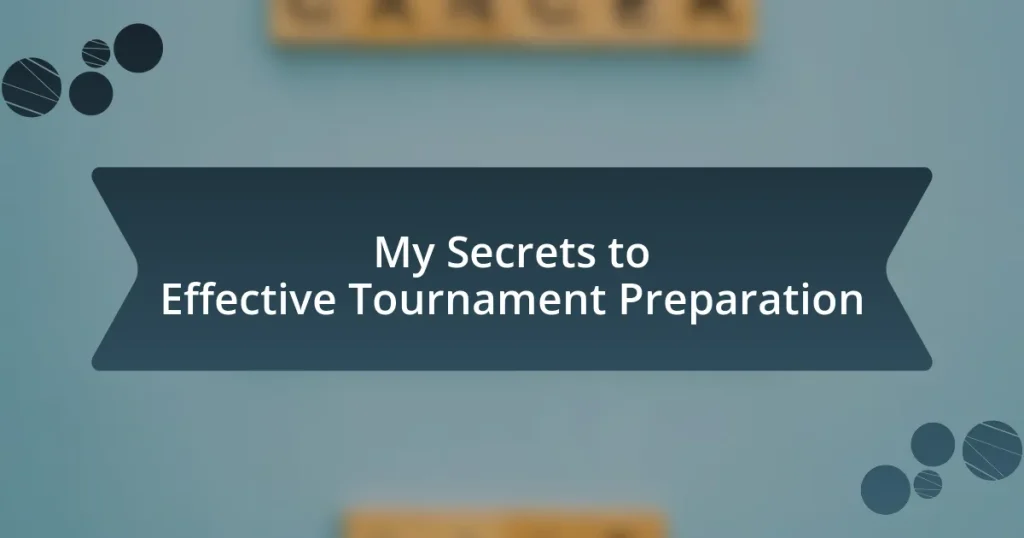Key takeaways:
- Understanding tournament requirements, formats, and gear regulations is essential for effective preparation.
- Setting realistic goals based on self-assessment and seeking feedback enhances motivation and performance.
- Developing a structured training schedule, including rest and recovery, improves training efficiency and reduces burnout.
- Practicing mental toughness through visualization and positive affirmations can significantly boost performance under pressure.
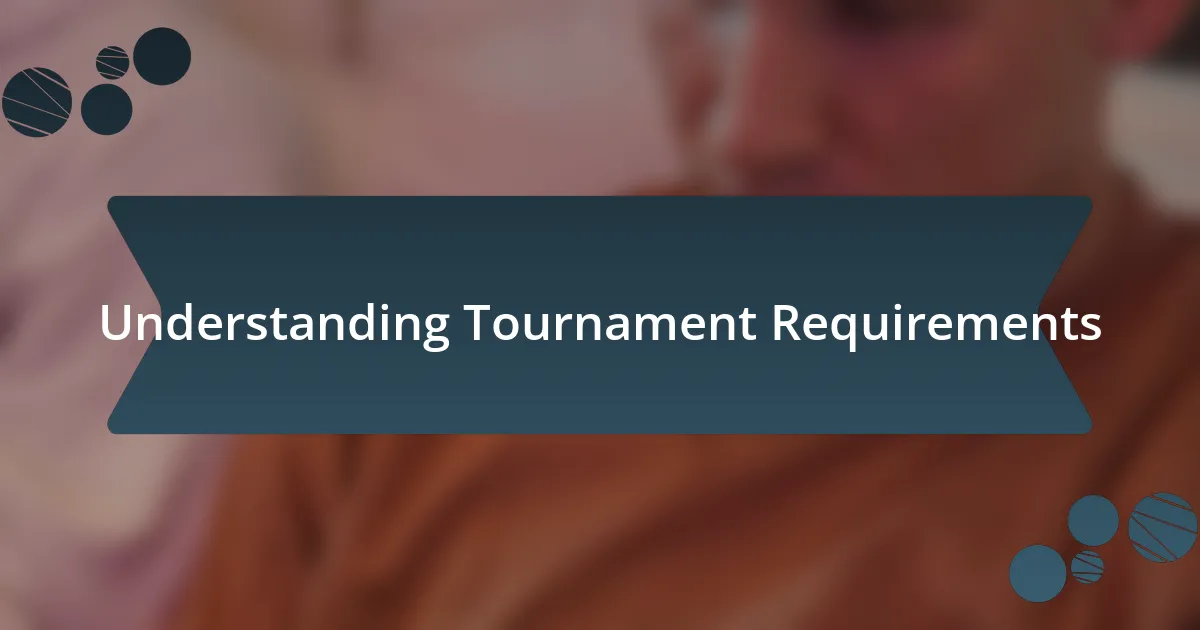
Understanding Tournament Requirements
To truly excel in a tournament, understanding its specific requirements is crucial. When I participated in my first major tournament, I remember feeling overwhelmed by the various regulations and prerequisites. I spent hours poring over the tournament guidelines, questioning what all the acronyms meant and how they would affect my strategy. Did I really need to submit my roster days in advance? The clarity I gained from this process significantly eased my nerves.
It’s incredible how much the rules can shape your approach. For example, some tournaments allow certain gear while others impose strict restrictions. I recall a time when I thought I could use a favorite piece of equipment, only to find it prohibited. This not only forced me to adapt but also taught me the importance of verifying requirements well in advance. Have you ever had a similar revelation that shifted your perspective on preparation?
Moreover, understanding tournament formats is equally essential. Whether it’s single elimination, round robin, or something else entirely, each format demands a different strategy. There’s a thrill in tailoring your game plan to these specifics. Once, I underestimated the importance of playing defensively in a round-robin format, assuming my aggressive style would suffice. The lesson? Always align your strategy with the tournament structure. What adjustments might you need to make for your next competition?
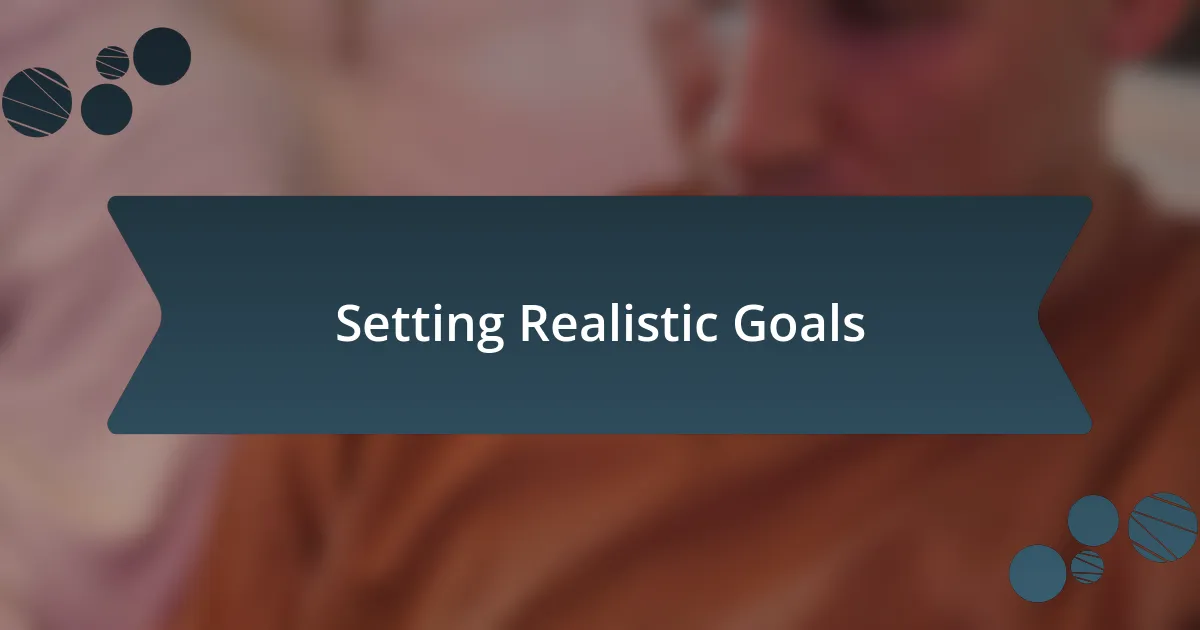
Setting Realistic Goals
Setting realistic goals is a foundational step in tournament preparation. I’ve learned through experience that setting unattainable objectives can lead to frustration and disappointment. During one of my early tournaments, I aimed to secure the top spot without considering my competitors’ skills. Unsurprisingly, the pressure I placed on myself only hindered my performance. Instead, focusing on achievable milestones, like improving my personal best or mastering specific techniques, made the experience far more rewarding.
When setting these goals, keep these key strategies in mind:
- Assess your current skills: Identify your strengths and weaknesses to tailor your goals realistically.
- Break down larger objectives: Instead of aiming for overall victory, set smaller, manageable goals to track progress.
- Be flexible: Adapt your goals as you gain experience and learn from tournaments.
- Celebrate progress: Acknowledge each achievement, no matter how small, to maintain motivation.
- Seek feedback: Regularly consult with coaches or experienced competitors to refine your aspirations.
Embracing this mindset truly transformed my tournament journey, making it much more fulfilling.
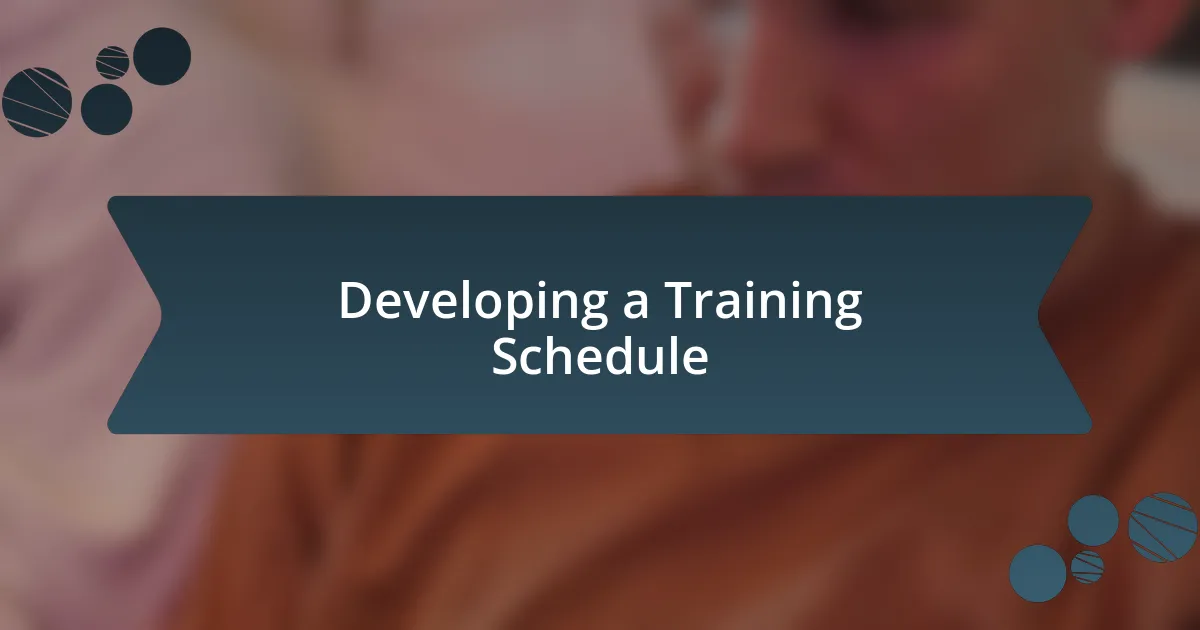
Developing a Training Schedule
Developing a training schedule is crucial for efficient tournament preparation. From my experience, a well-structured plan not only keeps you organized but also maximizes your training effectiveness. I remember a time when I was preparing for an important event. I haphazardly trained without a set schedule, leading to burnout and lackluster performance. The moment I created a detailed timetable, everything changed.
One effective strategy is to allocate specific days for different types of training. For instance, I often assigned Mondays and Wednesdays for technique drills, while Fridays were dedicated to sparring sessions. This clear division allowed me to focus my energy and improve my skills progressively. Plus, having a consistent routine provided a sense of stability, reducing my anxiety as the tournament approached.
It’s also essential to include periods for rest and recovery in your schedule. I cannot stress enough how vital this aspect is; without adequate rest, I found myself feeling fatigued and less motivated. Incorporating recovery days not only rejuvenated my body but also kept my mind sharp for upcoming challenges. Below, I’ve summarized a sample training schedule format that worked for me.
| Day | Focus Area |
|---|---|
| Monday | Technique Drills |
| Tuesday | Strength Training |
| Wednesday | Sparring Sessions |
| Thursday | Strategy Development |
| Friday | Cardio/Endurance |
| Saturday | Rest/Recovery |
| Sunday | Reflection & Planning |

Practicing Mental Toughness
Practicing mental toughness is as essential as physical training, yet often overlooked. I remember a tournament where I completely froze during a critical match. I questioned everything—my skills, my dedication, my preparation. It hit me that while I had trained my body, my mind was unprepared for the pressure. I realized mental resilience is something I needed to cultivate just as intensely.
One key technique I found effective is visualization. Before each competition, I would take a quiet moment to picture myself performing at my best. I invested time in mentally rehearsing not just the winning moments, but also how I would respond to setbacks. This practice notably transformed my confidence. Instead of fearing failure, I learned to see it as just another part of the journey. How have you envisioned your success?
Another approach is using positive affirmations. I started to adopt phrases like “I am prepared” and “I perform my best under pressure.” At first, it felt slightly silly, but as I continued, these affirmations became a source of inner strength. They helped push away the doubts that often crept in, especially just before stepping into the arena. I found that by promoting a positive mindset, I could combat negativity and focus on what truly mattered—performing.

Analyzing Opponents’ Strategies
When I began analyzing my opponents’ strategies, I approached it like piecing together a puzzle. Each match I watched revealed patterns in their movements and decision-making. I remember studying a rival who thrived on aggressive tactics, and by anticipating their plays, I was able to counter them effectively in our next matchup. Have you ever noticed a tendency in an opponent that completely caught you off guard?
Digging deeper into a player’s history can provide valuable insights. I compiled data on my opponents’ past performances—what worked for them and what didn’t. For instance, I noticed one competitor excelled under pressure but often struggled against specific techniques. This gave me the confidence to adapt my own strategies accordingly. How do you break down those critical moments to craft your game plan?
Connect the dots between their playing style and your own strengths. I learned that instead of solely focusing on what my opponents did well, I should leverage my unique abilities to exploit their weaknesses. It’s about finding the right opportunities to capitalize on their mistakes. This strategic mindset not only boosted my performance but also made me feel more in control. So, how can you turn your opponent’s strengths into your advantage?
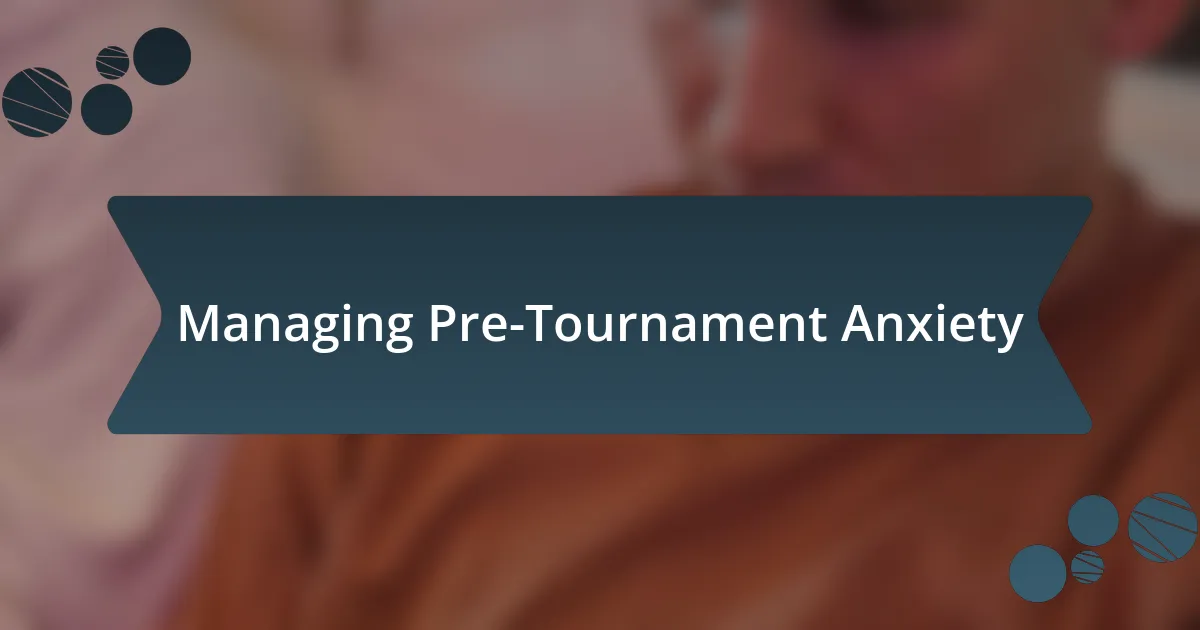
Managing Pre-Tournament Anxiety
Managing pre-tournament anxiety is something I’ve encountered frequently, but I’ve found ways to keep it under control. One effective method for me is visualization. Before the event, I spend some quiet time imagining myself performing successfully under pressure. This creates a mental image of success that calms my nerves, almost like a rehearsal for the real thing. Have you ever tried visualizing your performance ahead of time?
Another technique that works wonders is developing a routine. On the days leading up to the tournament, I stick to consistent practices, eating well, and getting enough rest. I recall one tournament where I felt anxious because I broke my usual schedule. The outcome? I underperformed. Now, I make sure to honor my routine, as it provides a sense of stability in the midst of excitement and anticipation. How does consistency play a role in your own preparation?
Lastly, I always remind myself that feeling anxious is perfectly normal. There have been times when I channeled that nervous energy into motivation instead of letting it overwhelm me. I still think of a particularly tough competition where my anxiety transformed into adrenaline, pushing me to give my best effort. Facing anxiety is part of the journey; how can you shift your mindset to view it as a catalyst for greatness?

Evaluating Performance After Tournament
Evaluating performance after a tournament is crucial for growth. I remember one tournament where I felt utterly defeated despite finishing in the top tier. It wasn’t until I sat down to analyze my gameplay, reviewing videos and taking notes, that I discovered specific areas for improvement. Have you ever felt that way after a competition, realizing that there’s always room to grow?
In my experience, feedback is a game changer. I often seek insights from coaches and fellow competitors, which helps me see my performance from different perspectives. At one point, a simple comment from a teammate about my decision-making transformed how I approached future tournaments. How do you gather feedback, and how has it influenced your journey?
Tracking my progress over multiple tournaments reveals patterns in my performance. I keep a journal where I jot down feelings, strategies, and outcomes. During one particularly challenging season, I noticed recurring mistakes I hadn’t acknowledged during the heat of competition. This reflection not only highlighted what to work on but also reminded me of my growth over time. Do you find documenting your journey helps you see the bigger picture?

